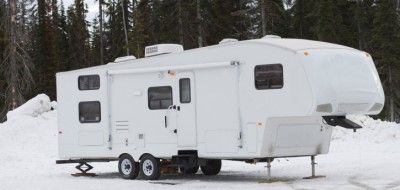All of us with air suspension hitches appreciate their value. However, I still hear from people with solid mount rigid fifth wheel hitches who tell me they do not have any problems with how their trailer rides. Just because the TV stays in place does not necessarily mean they have a good ride. When discussing suspension systems, you hear words like inertia, mass, sine waves, kinetic energy, etc. We are taking a simple problem and making it complex. There is ONE word to describe why we need additional suspension for our 5th wheel. It’s BUMP!
Let’s look first at the suspension on a pickup truck, normally leaf or coil springs with shock absorbers. When we hit a bump, the tire is the first thing to make contact. The tire itself will absorb approximately 25% of the bump, but what is not absorbed by the tire is transmitted to the springs and shock absorbers. The springs bend to dissipate the bump and the shocks move in conjunction with the springs to dampen the movement of the springs and also absorb more of the bump. If the bump is so big that the tires, springs, and shocks can’t absorb it, then the remainder of the shock is transmitted into the frame of the vehicle. When this happens, the portion of the shock transmitted into the frame of the vehicle results in stress and fatigue.
 The suspension system on light duty vehicles is designed for a given weight load. Normally this load will not vary more than 500-1200 pounds. Given that factor, the suspension is designed to absorb most of the bumps the vehicle comes in contact with, making for a smooth ride under most conditions. An often overlooked factor is the weight ratio between the pickup and the trailer. When the trailer grossly outweighs the pickup there will be adverse effects on the ride of the pickup. When the RV trailer tires come in contact with a bump that is so large that the trailer suspension cannot dissipate the energy, it is transferred to the bed of the pickup via the connection of the rigid 5th wheel trailer hitch. This energy is then translated into the jerking action felt in the truck. When a separate suspension system is installed in the bed of the truck (an air ride trailer hitch) the energy from the bump is now translated into the movement of the 5th wheel trailer hitch through the air springs. By using an air ride trailer hitch almost all of the fore/aft and up/down motion is removed from the trailer and truck.
The suspension system on light duty vehicles is designed for a given weight load. Normally this load will not vary more than 500-1200 pounds. Given that factor, the suspension is designed to absorb most of the bumps the vehicle comes in contact with, making for a smooth ride under most conditions. An often overlooked factor is the weight ratio between the pickup and the trailer. When the trailer grossly outweighs the pickup there will be adverse effects on the ride of the pickup. When the RV trailer tires come in contact with a bump that is so large that the trailer suspension cannot dissipate the energy, it is transferred to the bed of the pickup via the connection of the rigid 5th wheel trailer hitch. This energy is then translated into the jerking action felt in the truck. When a separate suspension system is installed in the bed of the truck (an air ride trailer hitch) the energy from the bump is now translated into the movement of the 5th wheel trailer hitch through the air springs. By using an air ride trailer hitch almost all of the fore/aft and up/down motion is removed from the trailer and truck.
So if you think you do not have a problem with your trailer’s ride just because the TV stays in place, isn’t necessarily true. The bouncing and chucking of the 5th wheel can cause damage that will remain unnoticed until a costly repair becomes necessary.
Remember, when your truck rides too rough you cannot simply release air from the air springs on your truck. That changes your driveline angle and causes more problems. The proper way to solve the hard ride is to install an air suspension system between your truck bed and your fifth wheel trailer. An air suspension hitch will prevent damage to your fifth wheel RV trailer and truck. It’s also a lot easier on your back!





Pingback: viagra female
Pingback: Air Jordan 5 Embroidery Retro Black Silver
Sburk
My wife and I have had two 5ers and curently own a 39 foot 3 slide rig. We live in the Pacific Northwest and travel the Rockies and Coastal Mountains on all types of roads. In many thousands of miles I have yet to experance bouncing and chucking and at times wounder if I ame doing something wrong because I don’t. I have run my loaded rig and trailer through State truck scales and know that my load on the trailer and hitch do not exceed the trailer or truck load limits.
Bottom line, match your truck to your load – don’t overload the trailer and most of all drive for the current road conditions. If you don’t do these things I suspect you are going to damage your unit no mater what type of hitch you use.
darthvagrant
The road shock delivered from the truck to a fifth wheel is miniscule compared to that from the fifth wheel axles and suspension. The crude
“suspension” on a fifth wheel is hardly any legitimate suspension compared to that of the powered vehicle industry. (To wit: Cars, trucks
of any kind) The air suspended fifth wheel truck mount is an ingenious
device, the expense of which vastly exceeds its real worth.
.
Yeah-I know.
There are doubtless hundreds of anecdotal reports of how great they
are. The imagination can be a significant influence on one’s critique,
particularly after a costly purchase of an item.
.
Uhh…I think in the pharmaceutical industry that is referred to as the placebo effect.
Jereome Jefferson
Air hitches may be nice. I don’t know, I don’t own one. I do know that my 1 ton dually is more than adequate to tow my 12,000 lbs loaded 5ver. The ride is smooth, no chucking or jerking. The ten year old truck has more than 150,000 mile and the 2005 trailer has approx 30,000 on it. The Reese 16K hitch is almost as old as the truck. No suspension problems and stored items stay in place. The point that I’m trying to make is if you buy a truck that has the capacity to handle your trailer and you realize that you are not driving solo, you don’t need an air ride hitch. I have a class A CDL and have well over a million big truck miles of travel throughout this country and Asia.
If you just have to have an air ride, it’s your dollar. You just don’t need one with the right setup.